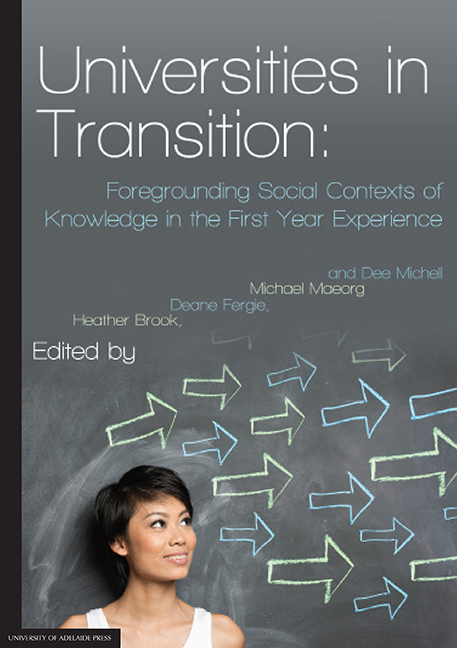Book contents
- Frontmatter
- Contents
- Notes on Contributors
- Introduction
- Part 1 Reconceptualising: transition and universities
- 1 Navigating student transition in higher education: induction, development, becoming
- 2 University transitions in practice: research-learning, fields and their communities of practice
- Part 2 Revaluing: ‘non-traditional’ student groups in higher education
- Part 3 Realising: transformations on campus
2 - University transitions in practice: research-learning, fields and their communities of practice
from Part 1 - Reconceptualising: transition and universities
Published online by Cambridge University Press: 05 December 2014
- Frontmatter
- Contents
- Notes on Contributors
- Introduction
- Part 1 Reconceptualising: transition and universities
- 1 Navigating student transition in higher education: induction, development, becoming
- 2 University transitions in practice: research-learning, fields and their communities of practice
- Part 2 Revaluing: ‘non-traditional’ student groups in higher education
- Part 3 Realising: transformations on campus
Summary
Abstract
This chapter is about university transitions in practice. It seeks to extend the scope of enquiry from a narrow concern with undergraduate student transition (see Parker and Gale, Chapter 1, this book) to a university- and field-wide approach by developing a practice perspective on universities and the university field. Practice is our point of departure. Universities are the focus. The concept of research-learning is introduced as the generic but richly variegated practice at the heart of any university. Analysis moves to consider how fields of research-learning practice are constituted in and through communities of practice and how learning and transition are at the heart of communities of practice. This brings consideration to tensions at the intersection of potentially global and diasporic research-learning fields and their position in local universities and communities, broader social forms and the global university field. The chapter then turns to explore how these insights can inform the design and delivery of courses of research-learning practice in a university. I introduce a practicum approach to research-learning.
Introduction
In this chapter I seek, with Parker and Gale (Chapter 1, this book), to broaden the scope of inquiry into university transition. Student transitions, Parker and Gale argue — and especially the transitions of undergraduate students — have dominated inquiry. Such student-centred inquiries sit behind ‘transition programs’ orienting, inducting, informing and enhancing the first-year experience of neophyte students coming to university. Meanwhile, what a university is or does remains largely taken for granted.
Information
- Type
- Chapter
- Information
- Universities in TransitionForegrounding Social Contexts of Knowledge in the First Year Experience, pp. 41 - 74Publisher: The University of Adelaide PressPrint publication year: 2014
